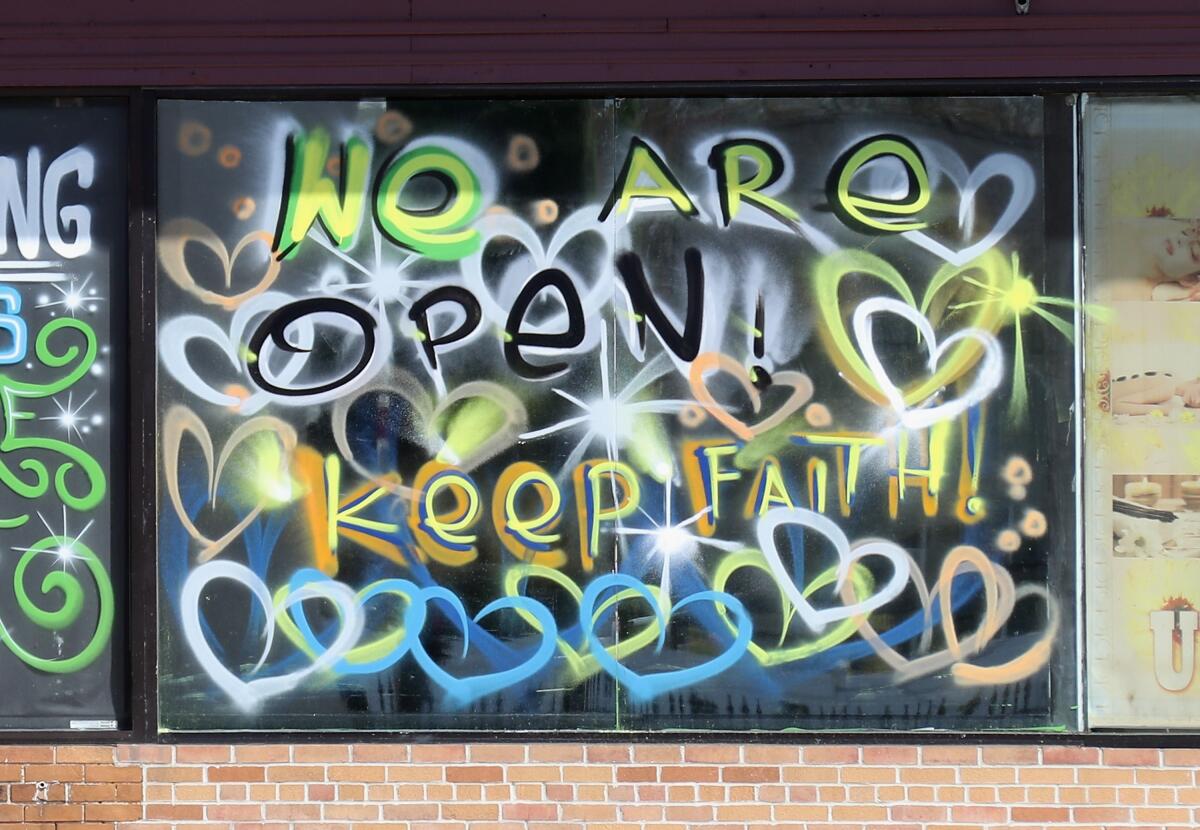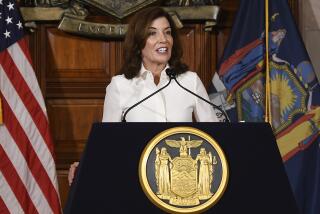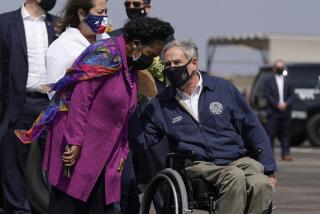Cuomo on coronavirus stay-home sacrifices: ‘What you’re doing is actually saving lives’

- Share via
New York Gov. Andrew Cuomo on Saturday acknowledged frustration with coronavirus stay-at-home orders that have kept his state’s residents largely restricted to their homes for nearly two months, but he compared them with past generations’ sacrifices during prior national crises.
“It’s been 56 long days,” Cuomo said at his daily briefing, before noting that the Spanish flu pandemic, the Great Depression and several wars lasted years. “This is a terrible experience to go through. But we will manage it, we will handle it and we will be the better for 56 days of this inconvenience. Think of it this way: What you’re doing is actually saving lives.”
The Democratic governor spoke as the COVID-19 death toll topped 53,000 in the United States, according to Johns Hopkins University. That’s about one-fourth of the total deaths reported around the globe.
Small but vocal groups of protesters, and at times President Trump, have been urging governors across the nation to reopen their economies. Rallies Saturday included one in New Mexico.
Trump didn’t brief the nation on the virus Saturday for the first time in over a week, but he took to Twitter to air grievances against Democrats and the media and to again encourage the reopening of the economy. He reiterated a line he had used previously to argue that closure of the economy has negative effects on workers and could result in more deaths than the pandemic.
“Remember, the Cure can’t be worse than the problem itself. Be careful, be safe, use common sense!” Trump tweeted.
Several states are taking sharply different approaches from New York and other states continuing their lockdowns — Iowa will allow elective surgeries and farmers markets to occur starting Monday; Georgia allowed bowling alleys, nail salons and tattoo parlors to open for business Friday.
Atlanta’s Democratic mayor, Keisha Lance Bottoms, who has opposed the openings as dangerous, responded Saturday by tweeting the latest infection and death tolls, and writing, “If you’re getting your nails done right now, please share these noon numbers with your manicurist. #StayHomeGeorgia.”
On Saturday, Florida officials invited the public to submit comments on how to reopen the state’s economy. Some beaches have already been reopened, and Gov. Ron DeSantis, a Republican, spoke of gradually allowing the state’s restaurants and shops to resume business.
The first phase will be “a very small step forward,” DeSantis said at a morning news conference. “I’m not in a rush.”
DeSantis and Cuomo authorized pharmacists in their states to administer coronavirus tests, which will provide a key piece of data as officials determine how to safely reopen their economies. Over 5 millions tests have been administered across the nation, but experts agree that far more testing as well as contact tracing will be necessary to fully return to normal.
New York state has been the hardest hit part of the United States by the pandemic, and is unlikely to reopen its economy in a substantial way any time soon. Cuomo said the state has avoided 100,000 infections because of the sheltering-at-home orders. The number of hospitalizations in New York fell to its lowest level in three weeks, and the number of deaths daily has been declining, though he noted that there was a small uptick Friday.
Officials in New Jersey, also hit hard, reported that their infection and death counts are flattening. More than 105,500 have tested positive for coronavirus and 5,863 have died.
“We cannot ease up one bit on our social distancing,” said Gov. Phil Murphy, a Democrat.
There continue to be hot spots and areas of concern across the country, notably at meat-packing plants. Coronavirus infections have led to the shuttering of pork, beef and poultry processing facilities in several states, and slowdowns at others. The reduced production could lead to shortages at grocery stores as soon as next month. The federal government has signaled it will step in to assist farmers in states such as Iowa, either to find places that can process their animals or in culling their herds.
In other parts of the country, the president’s suggestion that disinfectants could possibly be used to treat COVID-19 have had reverberations.
Poison control centers in Illinois, New York and Maryland reported increased calls from people either asking about using household cleaners to treat coronavirus or reports of exposure, according to local media reports. These calls came in after Trump speculated during a White House briefing on Thursday that injecting disinfectants could be a treatment for COVID-19.
Maryland health officials decided to post an alert after receiving more than 100 calls, according to ABC News.
“This is a reminder that under no circumstances should any disinfectant product be administered into the body through injection, ingestion or any other route,” the Maryland Emergency Management Agency tweeted.
The Associated Press contributed to this report.
More to Read
Sign up for Essential California
The most important California stories and recommendations in your inbox every morning.
You may occasionally receive promotional content from the Los Angeles Times.














